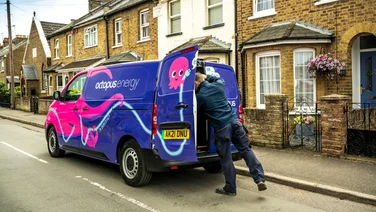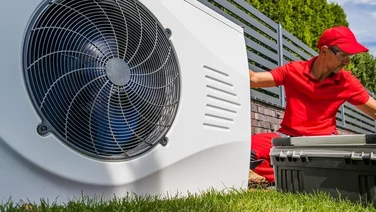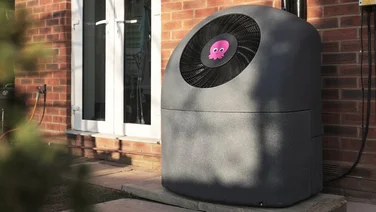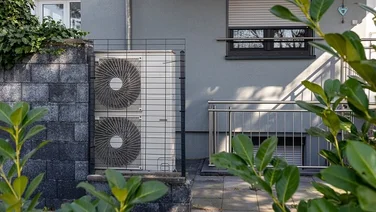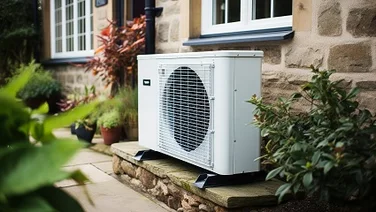- Heat pumps are designed to both save you money and slash your carbon emissions
- The average heat pump cost varies between £6,000 to more than £30,000
- An air source heat pump will typically save you £4,891 over its lifetime
- Heat pumps are between 300% and 600% more efficient than gas boilers
Heat pumps are designed to both save you money and slash your carbon emissions, and with the gas boiler ban still in place for 2035, they will soon be one of the only ways to effectively heat your homes.
They can extract heat from the coldest air, ground, or body of water; they operate so quietly you’ll barely hear them; and they fit nearly on the outside of your home, instead of taking room inside.
The average heat pump cost varies between £6,000 to more than £30,000, but many can take advantage of the Boiler Upgrade Scheme that will shed £7,500 off the final cost.
Most recently, Ofgem updated its guidance, meaning more will now qualify for the scheme. It now means that homeowners will no longer be required to install cavity wall or loft insulation in order to qualify for the scheme, in a move that could save consumers up to £2,500 on the upfront costs of installation.
If you’re still not convinced if a heat pump is worth it, we dive into more detail in this guide. We’ll discuss the benefits, available schemes and our final verdict on if heat pumps are worth it.
Want to skip the reading? You can fill in this form to compare the best heat pumps on the market. We’ll pass your details on to our expert suppliers, who’ll send you free quotes to compare.

Get free heat pump quotes
Answer a few quick questions, and our trusted installers will send you bespoke heat pump quotes – for free.

Are heat pumps worth the investment?
Heat pumps are usually worth the investment.
An air source heat pump will typically save you £4,891 over its lifetime, compared to a gas boiler – which means you can actually cut your costs by going green.
This is down to a combination of rising gas prices, the government’s Boiler Upgrade Scheme, the increasing efficiency of heat pumps, and the need to replace a boiler after 10 years – unlike an air source heat pump, which generally lasts 20 years.
Water source heat pumps can potentially save you even more money on your energy bills, as they’re typically 4.5 times more efficient than gas boilers – and 1.5 times more efficient than air and ground source heat pumps.
Ground source heat pumps will massively cut your carbon emissions, future-proof your house from future boiler bans, and provide you with a consistent year-round supply of heat – but they are significantly more expensive.
When it comes to costs, you should also take into account whether you’ll need to change your radiators or install underfloor heating before you get a heat pump, which could add to your expenses.
Let’s look at each of these factors in turn.
Helping to navigate the changing cost of energy
Heat pumps are between 300% and 600% more efficient than gas boilers, but they’re powered by electricity, which currently costs four times more than gas in the UK.
While the latest Ofgem Energy Price Cap will see energy prices increase 10% from 1 October to 31 December, heat pump owners can utilise renewable energy-specific tariffs that will have you paying less overall.
The future of energy pricing is hard to predict, so it’s worth comparing your monthly electricity bills currently to a renewable energy tariff and see what savings you can expect to make.
According to Alan, an Octopus Energy customer who had an air-source heat pump installed: “It was 5 degrees outside and I looked at what the heat pump was costing to heat the whole house and it was costing 20p an hour. The equivalent on a gas boiler would have been £1.33.”
Available grants to help lower the cost
The Boiler Upgrade Scheme is the main heat pump scheme for those in England and Wales, offering £7,500 towards the cost of your heat pump.
This can significantly lower the cost of heat pumps. The average cost for an air source heat pump, for example, is £10,000 to buy and install, on average, meaning you can get a top model heat pump for a lower cost up front.
Eligibility requirements include:
- Your property must be a home or small non-domestic building in England or Wales. The maximum installation capacity of 45 kWh covers the vast majority of these properties. The overall system capacity for any shared ground loop system must not exceed 300kWh.
- You must have a valid EPC rating
- Where a low carbon heating system has been commissioned prior to an installer submitting a voucher application, installers must ensure the voucher application has been, or will be, properly made within 120 days of the commissioning date stated on the MCS certificate.
- You must be fully replacing an existing fossil fuel system, such as an oil or gas boiler, or an electric heating system such as storage or panel heaters. Funding isn’t available for the replacement of existing low carbon heating systems.
- The installation cannot be funded by more than one source of public funds and you cannot apply if you have already been given government funding or support for a heat pump or biomass boiler.
- You can still apply if you’ve received separate funding for energy efficiency upgrades, such as insulation, doors or windows.
- New build homes and social housing are not eligible for the scheme, although self-build properties are eligible.
Funding for the Scheme is currently confirmed until 31 March 2028.
The application for the scheme is installer-led, with the installer applying for the grant on the property owner’s behalf. Your chosen installer will need to be certified by the MCS.
Your chosen installer will:
- Discount the value of the grant from your invoice
- Apply to Ofgem, the scheme administrator, for a grant voucher
- Provide your details to Ofgem, who will then email you asking for consent to the installer applying on your behalf
- Liaise with Ofgem on most matters related to the scheme
- Complete the installation in line with industry standards and scheme requirements
- Redeem the voucher and receive the grant following installation and commissioning

Get free heat pump quotes
Answer a few quick questions, and our trusted installers will send you bespoke heat pump quotes – for free.
A heat pump will help you stay ahead of the upcoming boiler ban
The Boiler Upgrade Scheme, arguably, was created with the gas boiler phaseout in mind, along with the related target to install 600,000 heat pumps in homes each year by 2028.
As it stands, gas boilers will be banned from 2035, but in June, Labour had vowed to scrap this in favour of financial incentives to install low-carbon technologies, like heat pumps.
Ed Miliband said at the time: “On home heating – as we said in our manifesto – no-one’s going to be forced to rip out their boiler. We’re absolutely clear about that.
“We haven’t stuck with the government’s 2035 target when you can’t replace your gas boiler. We’ve got to show that heat pumps are affordable and are going to work for people.”
As time passes, however, companies will inevitably become less enthusiastic about manufacturing new gas boilers for a dwindling customer base, resulting in declining standards across the industry.
If you want to speed up the process of finding your perfect heat pump, use our form and our experts will be in touch with their best prices.
The growing demand and increased efficiency
The popularity of the Boiler Upgrade Scheme highlights the growing demand for heat pumps. In fact, according to the latest figures from the government.
As of May 2024, applications for the scheme increased by 26% month-on-month, receiving 2,987 applications, more than double what it received in May 2023. This took the total figure to 43,246 since it began in April 2022.
In total, 96% of applications have been for air source heat pumps.
Heat pumps are also becoming more and more efficient. The average rate is 300%, but the top models have already hit 500%, which would net you an even higher amount of energy bill savings over a machine’s lifetime.
Do you need building regulations and planning permission?
For the majority of homeowners, you no longer need to worry about getting planning permission to install a heat pump, and some suppliers will cover this in the assessment reports prior to installing one.
With Evergreen Energy, for example, this is included as part of its Home Assessment Report, checking that everything is good to proceed.
But this will be dependent on your region.
In Scotland, for example, an air source heat pumps external unit and housing can’t exceed 3 metres in height, but in England, it can’t be larger than 0.6m3. If it does, you might need permission to install it.
Overall, as long as it meets the requirements set out within your region, you won’t need to apply for planning permission.

What are the benefits of a heat pump?
Heat pumps are incredibly efficient, can cool and heat your home, and can create energy from air, ground or water – three completely renewable resources.
Plus, the Boiler Upgrade Scheme means you can save money on final installation costs, helping reduce the overall cost. There’s little work for you to do, too, as the installer will apply on your behalf.
As well as the financial benefit, you’ll also save at least 1.9 tonnes of CO2 emissions per year by replacing your gas boiler with a heat pump, according to the Energy Saving Trust.
Chris, an Octopus Energy customer, said: “We need to move away from burning fossil fuels due to the damage they cause. In the future, we’ll look back at this phase of destroying out planet and realise how crazy it was. It’s time to make a change, and the heat pump is a step in the right direction.”
If you have an oil boiler, you’ll cut at least 2.9 tonnes of CO2 per year from your carbon footprint and even if you use electric storage heaters, getting a heat pump will save you 1.6 tonnes.

Get free heat pump quotes
Answer a few quick questions, and our trusted installers will send you bespoke heat pump quotes – for free.
Our final verdict: Is a heat pump worth the investment?
Air source heat pumps are absolutely worth the investment, especially following the introduction of the Boiler Upgrade Scheme.
The prospect of saving tonnes of CO2 for the next two decades would be attractive on its own, but the sizable £4,891 saving is a big selling point.
It’s even more appealing when you consider this grant and the upcoming phaseout of gas boilers in new homes will likely be followed with further restrictions to ensure the UK reaches its net-zero carbon emissions goals.
As long as the gas boiler ban remains in place, it’s worth getting ahead of the curve while you can – and we can help. Fill in this short form, and our best heat pump suppliers will send you free quotes for you to compare.

